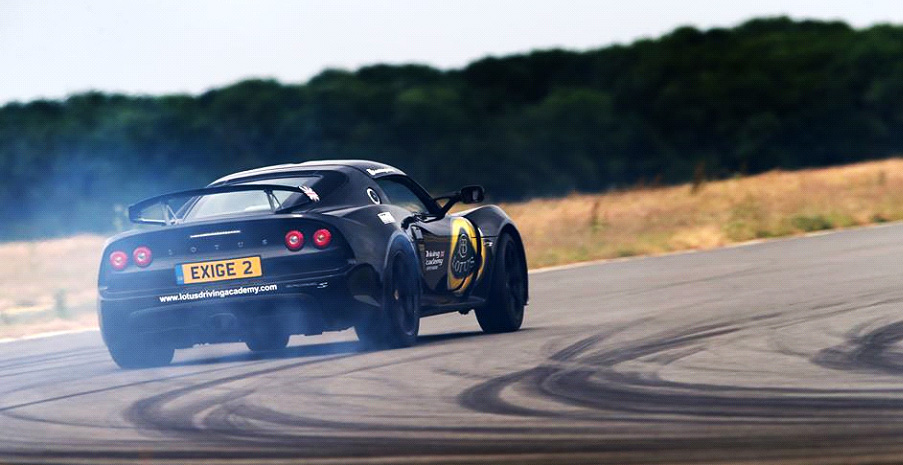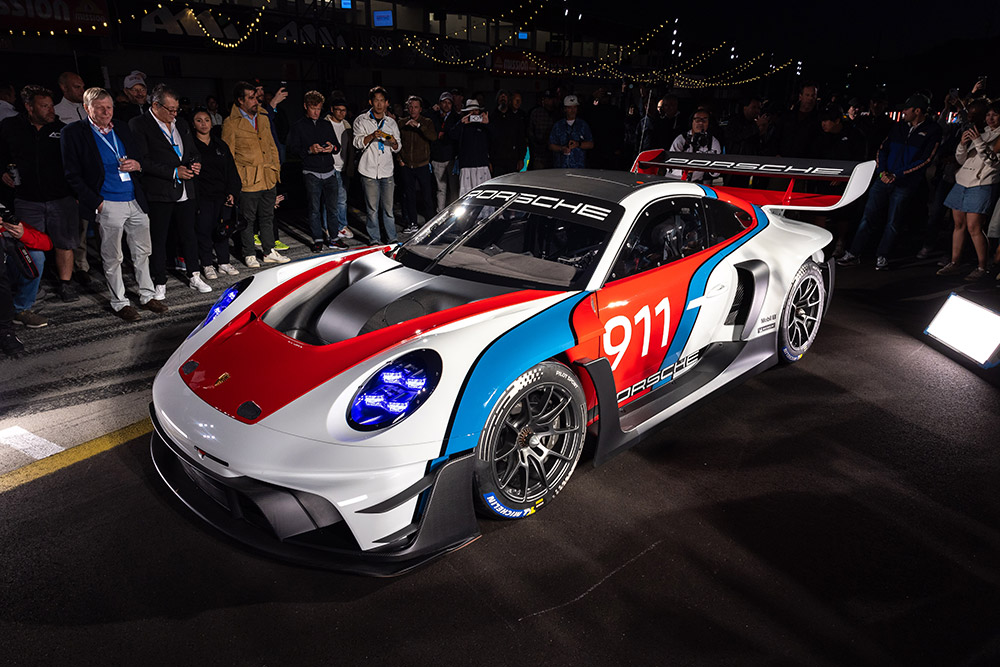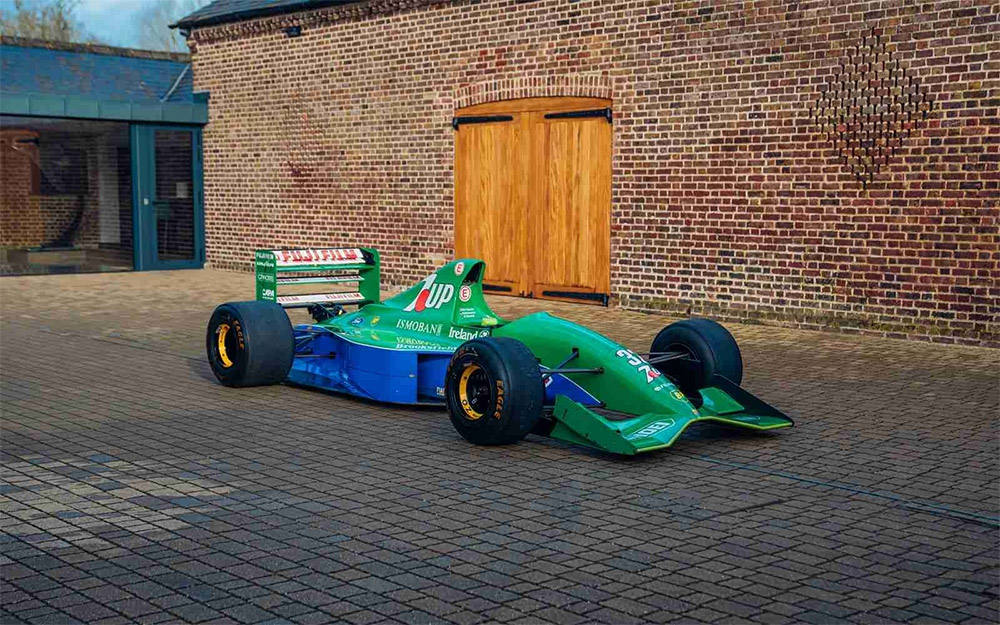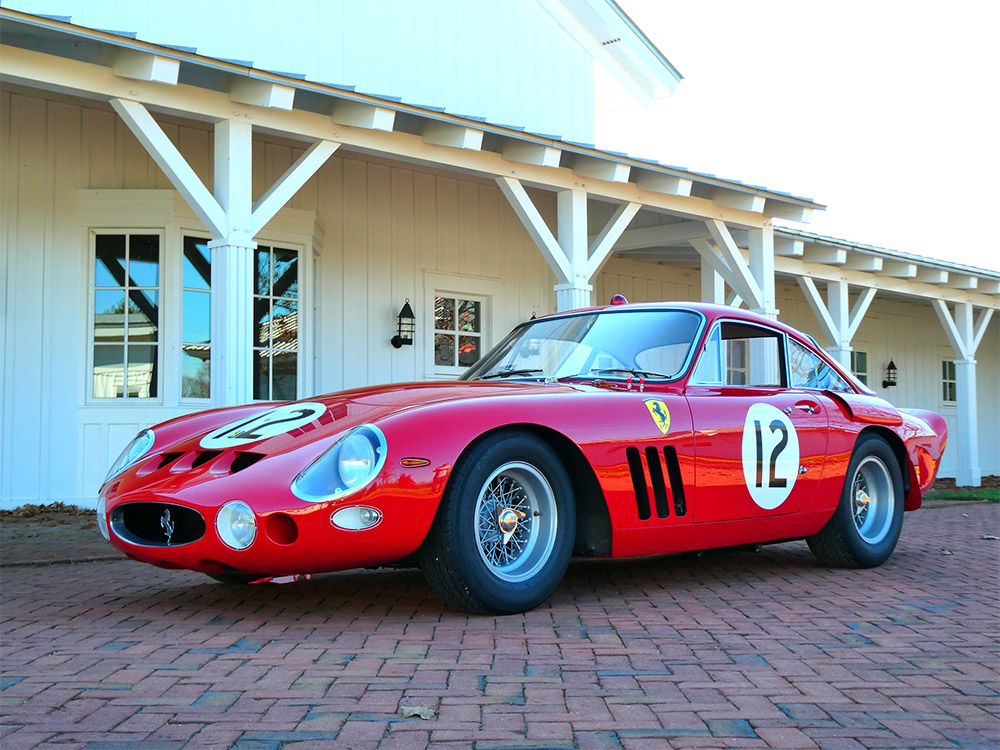Porsche has presented a spectacular track car for enthusiasts and collectors at Rennsport Reunion 7 at WeatherTech Raceway Laguna Seca. The 911 GT3 R rennsport, with a power output of up to 611 hp, is based on the new 911 GT3 R of the current 992 generation. The limited-edition track car was designed to perform even beyond the limits imposed by FIA competition rules. The result is one of the most extreme and focused 911s ever.
One of the special features of this unique collector’s item, which is limited to 77 units, is the distinctively designed body. The Porsche 911 GT3 R rennsport combines the powerful appearance of a high-performance race car with modern design elements. At the same time, it hails back to Porsche motorsport history without drifting into a retro look. As a thoroughbred racing car, the form of the 911 GT3 R rennsport continues to follow function.
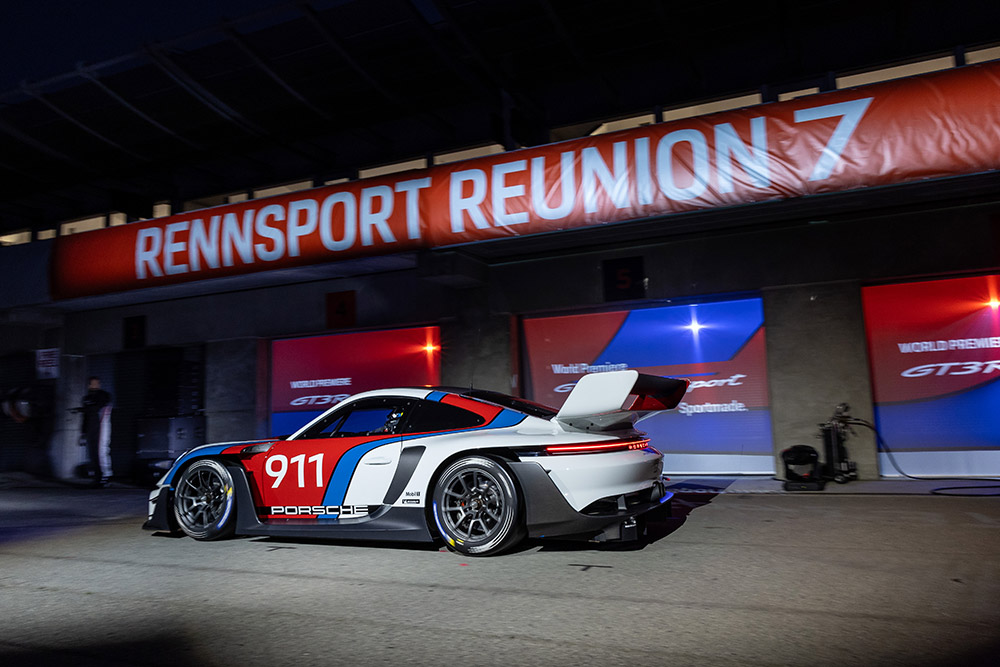
“The new Porsche 911 GT3 R rennsport offers the experience of driving a 911-based race car in what is probably the most primal form,” Thomas Laudenbach, Vice President Motorsport, emphasizes. “It gives you goose bumps whenever you look at it and it combines the finest motorsport technology with a design language that is typical of Porsche. With its exceptional performance, the 911 GT3 R rennsport makes our brand’s history both tangible and audible. It is only fitting that we will be presenting it to Porsche’s large fan community at Rennsport Reunion 7 in Laguna Seca. This is an exclusive offer to our customers who really knows only one limit: the limited edition of 77 units.”
This extraordinary sports car was designed by Grant Larson and Thorsten Klein from the Style Porsche team. “The 911 GT3 R rennsport will take its place as the logical successor to the modern Porsche 935, itself revealed at Rennsport Reunion 6 in 2018. While the 935 was technically based on the near-standard 911 GT2 RS Clubsport, the 911 GT3 R rennsport uses the current 911 GT3 R of the 992 generation as its basis. Beneath the extensively redesigned carbon skin is a thoroughbred racing car,” Larson emphasizes. The American was Director of Special Projects at Style Porsche for 14 years. Together with Thorsten Klein he is responsible for the individual, one-off vehicles of Porsche Exclusive Manufaktur. Thorsten Klein adds: “We have given the limited edition model a little more width and have visually stretched the length, while at the same time it sits very low on beautifully designed wheels. This gives it perfect proportions and makes it look even more spectacular.”
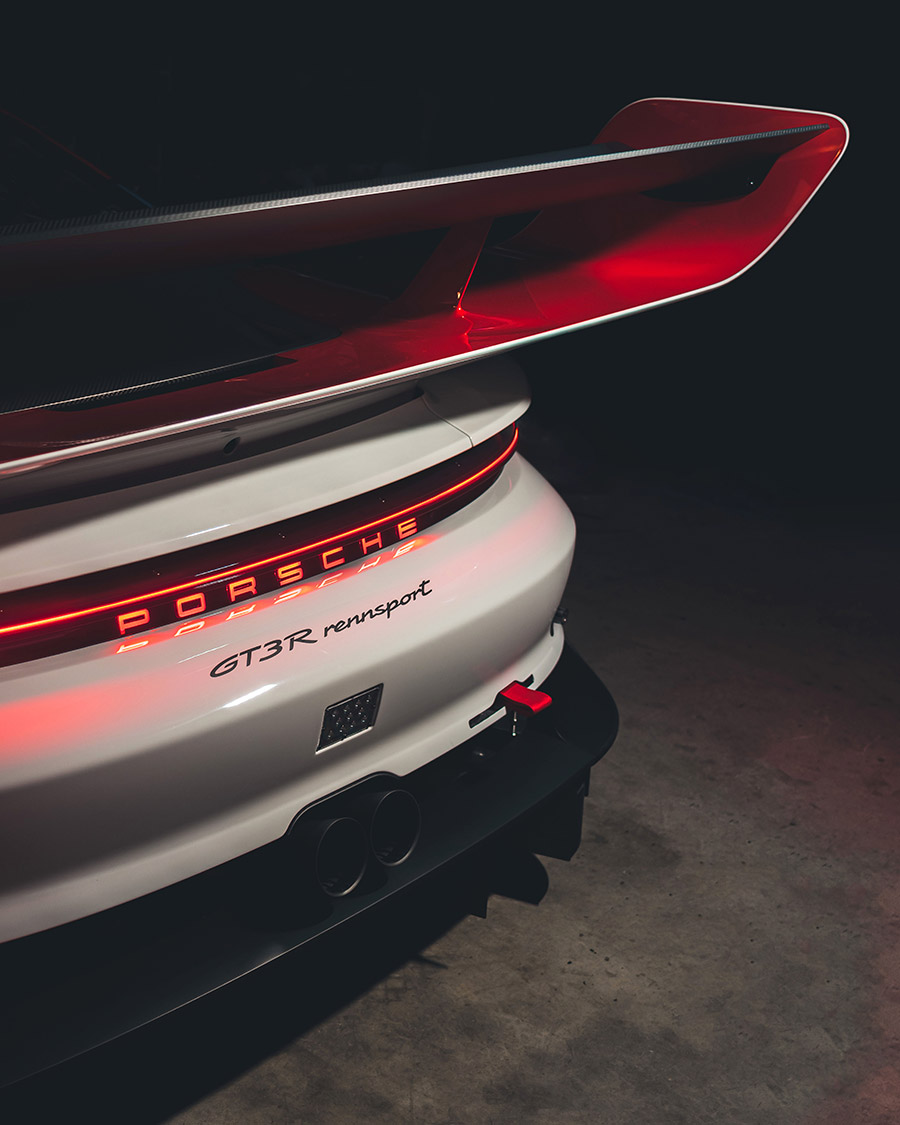
Distinctive design with powerful charisma and a broad rear end
Only the hood and roof carry over from the standard GT3 R. The rest of the body is changed. Larson and his team adopted most of the aerodynamically optimized geometry of the 911 GT3 R nose, including its cooling air intakes and ducts. The designers have also set visual accents in the area around the side fins and flics. They are now framed by a side cowl and protected against damage caused by external impact. The radically modified shape of the air intake and outlet panels of the front wheel arches underscores the revised appearance. Conventional exterior mirrors are gone. A system consisting of three cameras integrated into the exterior of the vehicle and monitors in the cockpit replace them.
Modifications to the rear end have a particularly distinctive character. The huge rear wing is the most obvious component. Its design is reminiscent of that of the legendary Brumos Porsche 935/77, with which the American Peter Gregg, together with the Dutchman Toine Hezemans and the German Rolf Stommelen, took the seventh overall victory for a Porsche at the 24 Hours of Daytona in 1978.
The bold wing design is also functional and develops enough downforce to require two additional vertical supports to compensate for the very high load it generates. In terms of their function, they are reminiscent of the Porsche 962 Le Mans racing car bridging the gap between past and present. A light bar consisting of fine LED strips, which now incorporate illuminated letters of the Porsche lettering, characterize the overall wider rear section. One level lower, the largely open rear fascia dispenses with grille covers and paneling to save weight. This provides a clear view of the technical components behind and the exhaust system.
The interior is also modified compared to the 911 GT3 R. The monitors of the two fender-mounted exterior cameras blend into the interior on each side. Special graphics for the splash screen of the central display and the limited edition number on the instrument panel adopt the shape of the car, while ambient interior lighting matches the color-adjustable main headlights. All safety features imposed by the applicable FIA standards are present. The roll cage design permits the installation of the driver’s seat only. As is the case with the 911 GT3 R in worldwide use, the limited “rennsport” is a single-seat race car.
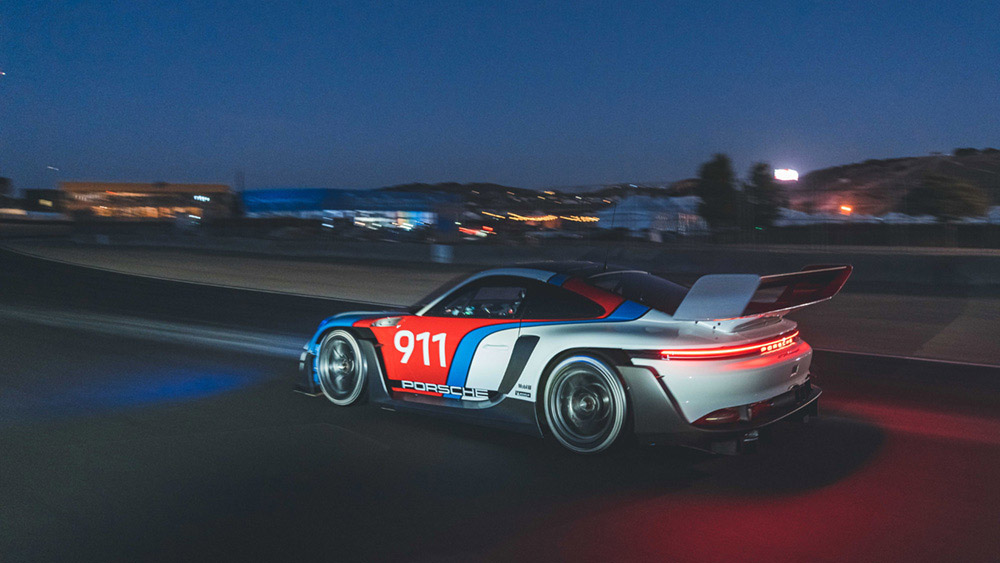
With their striking look, the 18-inch BBS wheels in their exclusive “racing” design also catch the eye. They meet all the technical requirements of a center locking competition wheel. Porsche Motorsport paints them in Dark Silver Metallic as standard.
New color concept with extended customization options
Porsche is offering the 911 GT3 R rennsport with a bodyshell painted in Agate Grey Metallic and bodywork in pure carbon. The race car will be available ex works for the first time in seven colors, including Ruby Star and Signal Orange, for example. In addition, there are three exclusive paintwork designs available that make further customization possible. “Porsche has been shaped by its rich history. This is especially true in racing,” Thorsten Klein, Style Porsche Project Manager for the GT3 R rennsport, said. “This has subsequently inspired us, of course, but by no means did we want to produce a copy or an obvious retro paint job. The three options we selected are new interpretations.”
The “Rennsport Reunion Design” is based on traditional motorsport colors and launches a wave across the amazing contours of the exterior body surfaces. It flows in a way that is reminiscent of the legendary Corkscrew corner combination at Laguna Seca, the venue chosen for the world premiere of the 911 GT3 R rennsport. This tribute underscores the proportions of the vehicle and its rear wing, which is further accentuated by its visible carbon surfaces. Together with a choice of optional paint schemes, they are generally covered with a semi-gloss clear coat. With its red and white color scheme, the “Flacht Design” features the colors traditionally used by Porsche Motorsport. It plays visually with the flared fenders in particular. “Flacht” is the name of a district on the border of Weissach, the location of the Porsche Development Center. The motorsport department is located on the edge of the complex and is technically located in Flacht despite being part of the areas commonly referred to in general terms as “Weissach.” The third option is the “Speed Icon Design”. It is based on different shades of blue, which focus primarily on the pronounced width of the vehicle.
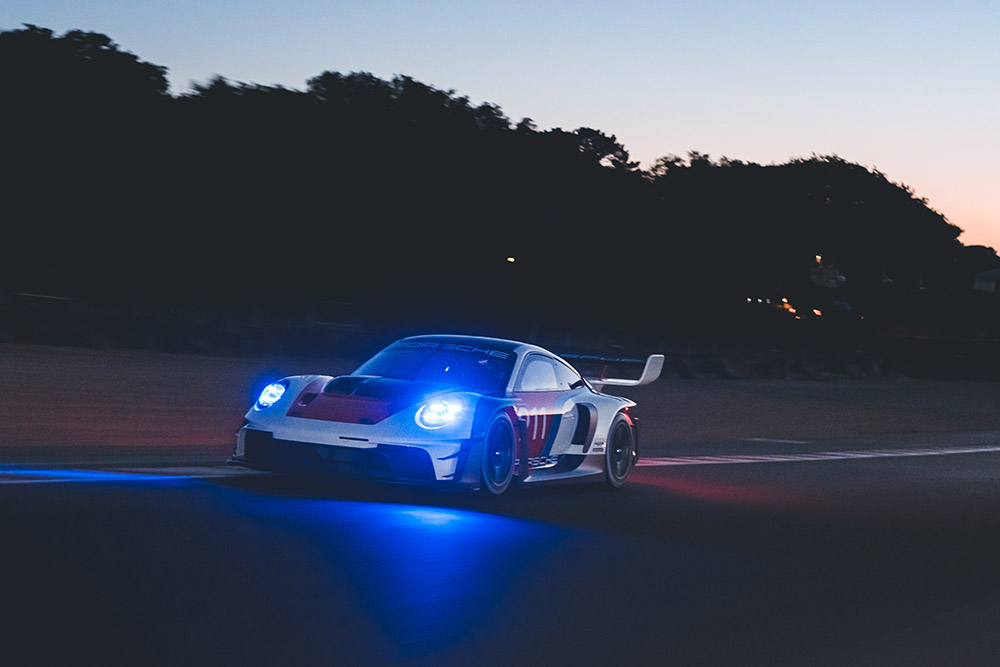
Even more powerful racing engine
In principle, the 911 GT3 R rennsport is based on Porsche’s current GT3 racing car. Compared with the 911 GT3 R of the 992 generation, however, the limited edition model goes beyond the strict limits imposed by FIA competition “Balance of Performance” (BoP) rules. The development team supporting Dr.-Ing. Andreas Singer has converted these additional freedoms into an even more emotional track car with numerous technical refinements. It combines increased engine power with reduced weight and a spectacular design with an awesome sound similar to that of the 911 RSR. The result is arguably the hottest track tool Porsche has ever offered as a collector’s item.
The 4.2-liter six-cylinder boxer engine of the 911 GT3 R, a power unit that revs up to 9,400 rpm, benefits in particular from the removal of motorsport series restrictions: it achieves power peak of up to 611 hp. This corresponds to a power output of approximately 145 hp per liter. It is thus significantly more powerful than the original power unit, which can develop up to 557 hp in the 911 GT3 R, depending on the BoP rating. The water-cooled four-valve engine with direct gasoline injection has been designed to run on E25 fuels. These include bio-ethanol fuels and eFuel, which make near carbon-neutral operation possible in the future. With their lower knocking tendency, they are paving the way for more advanced ignition angles and increased compression in the six combustion chambers. The pistons and camshafts developed specifically for the GT3 R rennsport engine deliver increased performance, especially when running on E25 fuels. The engine can also run on conventional fuel.
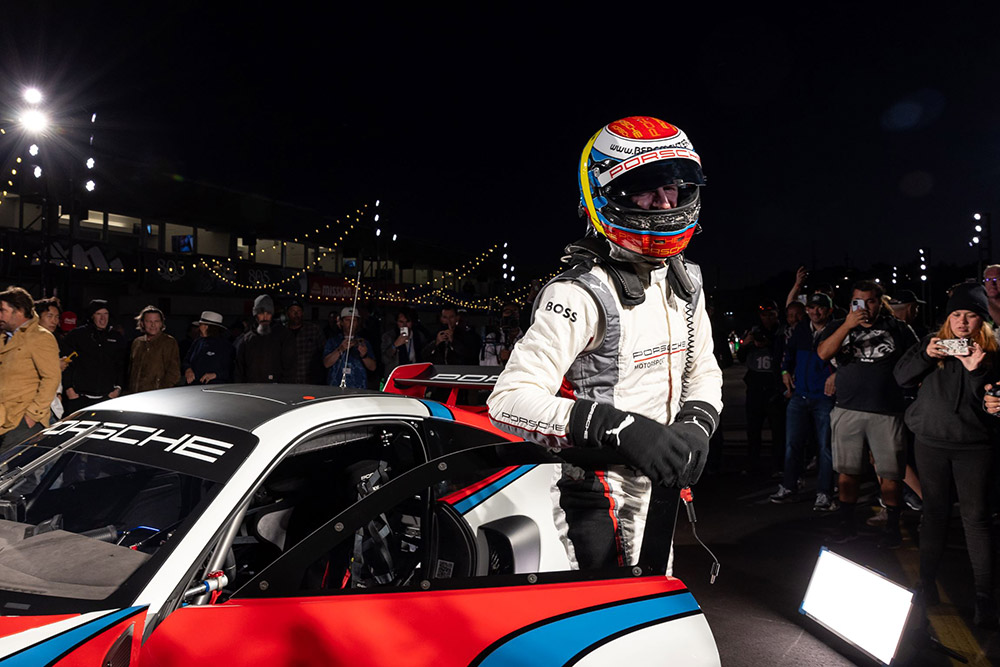
Power delivery to the rear wheels, including the sequential six-speed constant-mesh gearbox, originates from the 911 GT3 R with only minor modifications. Gear changes are made via steering wheel paddles that control an electronic gearshift actuator. The transmission ratio of the fourth, fifth and sixth forward gears corresponds to the Daytona set-up of the GT3 racing car. In sixth gear, with an engine speed of 9,000 rpm, it gives the car a top speed that is roughly 12 mph faster than the shorter FIA homologated gear ratio of the GT3 R.
In the unmuffled version, the racing exhaust system with centrally positioned twin tailpipes offers an authentic and extremely emotional engine sound. Two quieter versions fitted with mufflers and catalytic converters are available for racing circuits with noise restrictions.
The chassis is also basically identical to that of the GT3 racing car. At the front axle, a state-of-the-art double wishbone suspension layout is still used to perform wheel guidance with a multi-link suspension incorporated at the rear. The five-way adjustable racing shock absorbers from KW have a blow-off function. Porsche Motorsport delivers the 911 GT3 R rennsport with a specific basic set-up. Further adjustments to the suspension can be made using shims. Their benefit: they enable fine adjustments to be made without the need for time-consuming measurements of the suspension.
Another unique selling point of the car are the racing tires offered by Michelin exclusively for GT3 R rennsport customers. These tires benefit from a new construction associated with a new compound tread that result in an improved warm-up and drivability compared to the Michelin Pilot Sport M S9 (S9M). In addition, the specially developed tire design on the sidewall of the tire blends in seamlessly with the appearance of the vehicle.
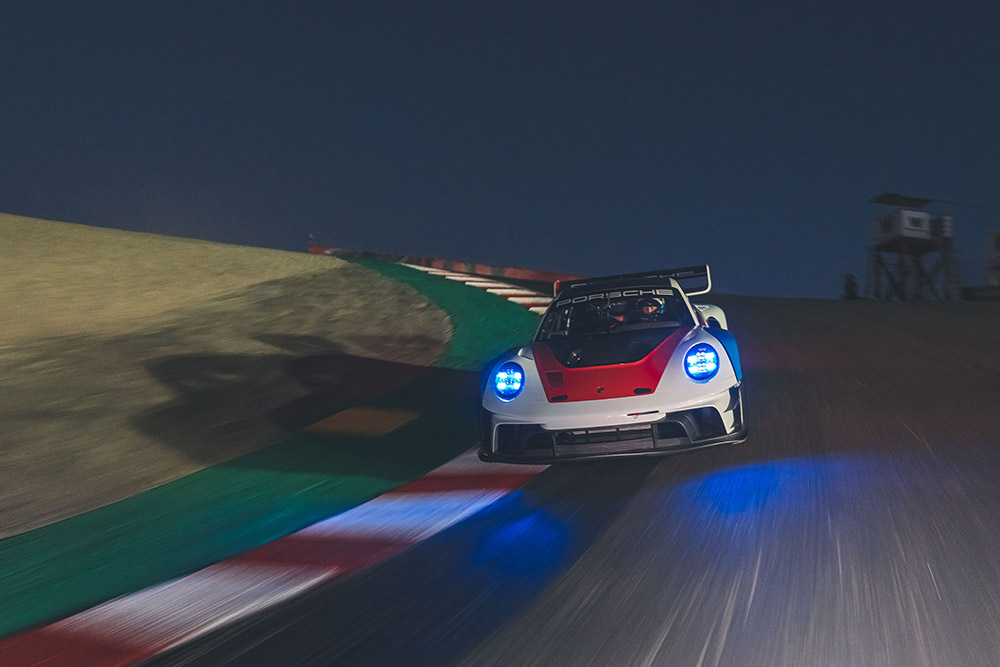
The aluminum monobloc racing brake system from AP has been given brake pads with titanium backing plates. They reduce the total unsprung masses by approximately 2.2 lbs.. The new FT3.5 safety tank with a capacity of 30.9 gallons is also a weight-saving feature, being 2.2 lbs. lighter than the previous version and in future can also be used in the 911 GT3 R for racing events. Another weight saving feature is the elimination of the air conditioning system. Ventilation for the driver is provided by the 911 GT3 R’s seat cooling concept. Overall, the developers are aiming to achieve a curb weight of 2,734 lbs. (1,240 kilograms) for the 911 GT3 R rennsport. This would be equivalent to a weight-to-power ratio of approximately 4.5 lbs / hp.
Porsche Motorsport is offering the limited edition 911 GT3 R rennsport at a price of $1,046,000 plus transport, options, and applicable taxes. Potential customers can register interest via this link.

